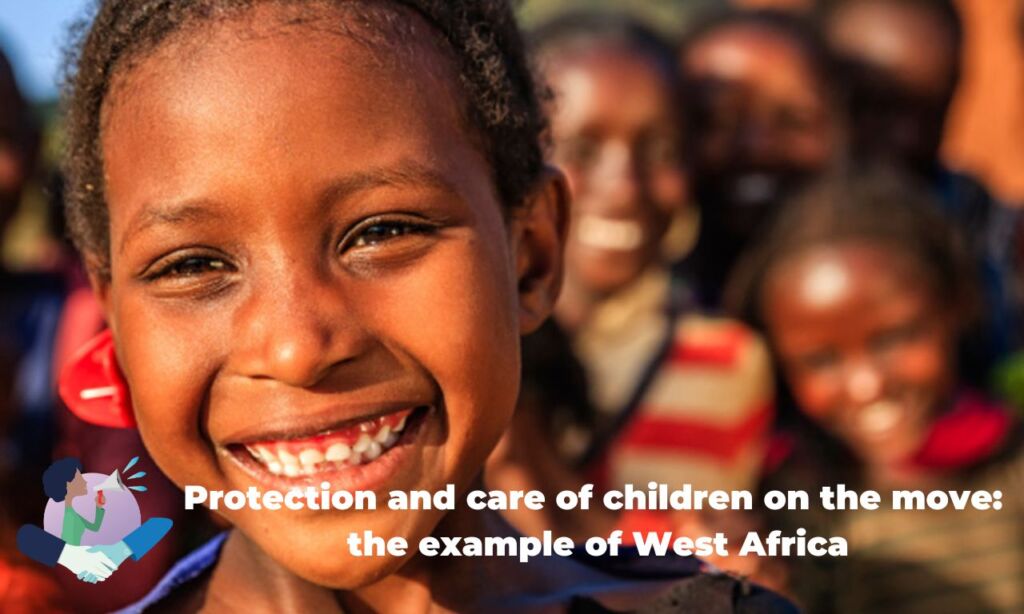
Protection and care of children on the move: the example of West Africa
- Written by: Fanny Baert, COO and Director Communications ISS, Sources: ISS Publications
- Pioneer advocacy
In this second article related to the protection of children on the move, we would like to highlight how ISS, together with civil society actors and government authorities, has contributed to the development of a regional mechanism to protect children on the move, now recognised and integrated in the policies and laws of the Economic Community of West African States (ECOWAS).
The 1979 Protocol of the Economic Community of West African States facilitated the free movement of people within the ECOWAS space in West Africa. As a consequence, since then, thousands of children and young people have been on the move. Often they have been fleeing economic, social, cultural, political or climate related conditions that prevent them from growing up enjoying all their rights. They have been looking for a better education and a brighter future.
Unfortunately, even with this evident regional movement, transnational measures to protect vulnerable groups on the move, including children, did not exist. Unaccompanied children, without the protection of a parent or guardian, have higher risks of falling victims to child traffickers, child labour, living in the street, harmful traditional practices, abuse and exploitation.
Recognising the need to act, and with the support of ISS Switzerland, the countries of West Africa decided to unite and work together to improve the protection support to these children. The result was the creation of the West Africa Network for the Protection of Children (WAN).
Meetings started in 2002 and from 2005 onwards, a regional cooperation mechanism (the West Africa Program) was established. Starting with three countries, a gradual development process over seven years (2005–2012) ultimately led all 15 countries of ECOWAS to implement the mechanism. Though not an ECOWAS Member State, Mauritania also joined the initiative in 2015. Although WAN was initially established independently of ECOWAS, in 2015, the ECOWAS Member States and the ECOWAS Commission validated and adopted the WAN mechanism.
WAN is a transnational mechanism of coordination and collaboration between different actors, civil society and government authorities, for the referral, care and protection of vulnerable children on the move with the ultimate aim to find sustainable solutions including reintegration in their families.
WAN is characterised by 1. Use of common procedures in cross border case management to guarantee quality cross border support, 2. Ongoing exchange of expertise and experiences, and collaboration between national actors and systems of child protection, such as between the host country and country of origin and 3. Use of a common database.
Today, WAN takes care of more than 1000 children on the move on a yearly basis. WAN counts 16 Member countries and 16 protection directors, counts on the help of 158 civil society organizations, and 96 grassroot community organizations, and partners with 40 international organisations and 191 governmental social services.
In 2012, with the technical support of ISS Switzerland, WAN published a manual of standard operating procedures for case management called “Support Procedures and West African Regional Standards for the Protection and Reintegration of Vulnerable Children (including Children on the Move and Young Migrants)”. This manual used an 8 step model, and gave concrete and practical guidance to social workers and other child protection professionals on the steps involved in case management, which include 1) identification, 2) emergency support, 3) study of personal situation, 4) assessment of the family, 5) assessment of alternatives, 6) reintegration, 7) monitoring, and 8) family and community support. The standards offered by this manual placed the child at the centre. The guiding principle was that “every child identified is unique, he or she should be orientated and accounted for”.
This manual has been the forerunner of the 2017 ISS Publication “Children on the Move: From Protection Towards a Quality Sustainable Solution.”
In June 2016, the ECOWAS Commission, in collaboration with ISS, organised a meeting for a group of regional experts from West Africa to review the 2012 manual as well as incorporate some elements of the Standards into the ECOWAS Child Protection Monitoring and Evaluation Framework to be included in the ECOWAS Child Policy and Strategic Plan of Action for Child Protection. ECOWAS’ goal was to create a desirable environment for children’s wellbeing by adjusting the legal framework, strengthening policies and institutional frameworks, and facilitate effective international and regional co-operation enabling all the member states to attain the goals of child protection.
This process led to the publication of the “ECOWAS Support Procedures and Standards for the Protection and Reintegration of Vulnerable Children on the Move and Young Migrants”. This document was based on the expertise acquired from the reintegration of more than 6,000 children on the move by WAN member organisations between 2005 and 2016.
As stated in the introduction of the publication, the support procedures are seen as a practical tool to support professionals in their daily work, and provides guidance for listening to and working with children. It aims to get children to be participants in their own solutions. Finally, it intends to emphasise the responsibility and duty of all parties in society to ensure the welfare of children, whether they are families, communities, teachers, traditional or religious authorities, entrepreneurs, NGOs or the State.
Sources and more reading:
https://www.ssiao.org/en/isswa
Chapter 21. The challenge of strengthening the regional child protection system for children on the move in West Africa, Olivier Geissler and Abimbola Lagunju, from the 2018 Research Handbook on Child Migration
The Frontiers of Childhood, https://www.youtube.com/watch?v=eLl9GJ-EdTY
Childhood Resources, https://www.youtube.com/watch?v=ucHl_GTVf30